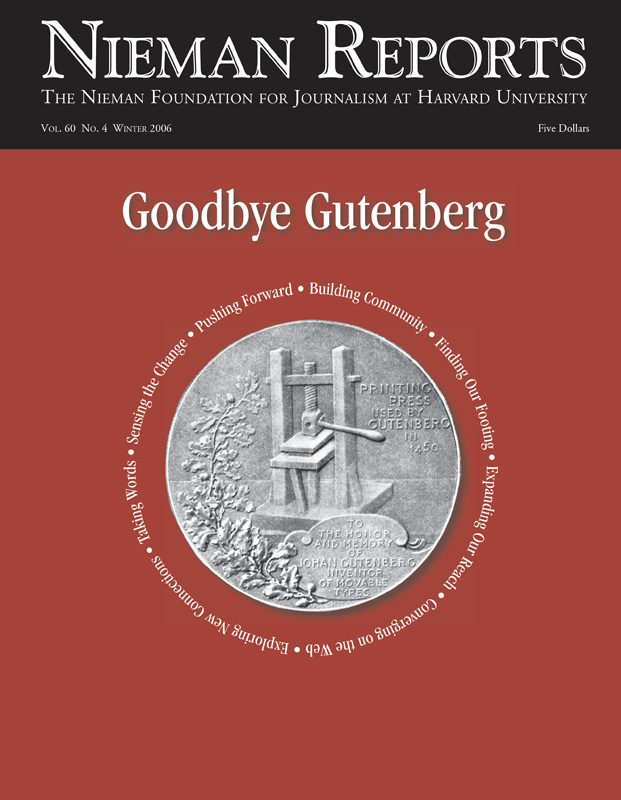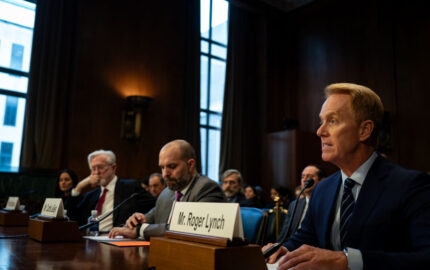Late in July, when a former member of the Minneapolis City Council went on trial in a high-profile bribery case, I received an e-mail from a local community activist alerting me to a woman who was determined to sit through the entire proceedings and describe the finer points of a trial that was headline news in the Twin Cities media.
EDITOR'S NOTE
Read Letter to the Editor by Liz McLemore »I went to the blog site where she was filing her report and spent the next half hour or so riveted by the excruciating detail she was providing. For better or worse, her words were the closest thing to a court transcript the public would ever see. And as the editor of the Twin Cities Daily Planet, a new online publication covering local news, I coveted any sort of reportage on a case that had been awash in controversy for the past six months.
I dashed off an e-mail to the blogger, a south Minneapolis political activist named Liz McLemore, and asked her if she would allow me to publish her courtroom chronicles for our Daily Planet readers. She was predictably flustered, curious as to why I thought her work was worth publishing, and keen to reveal her own political biases (she had worked on the campaign of the defendant's opponent in last year's election). But she eventually agreed to a deal: She would crank out her daily report on the trial, and I would grab it and post it on the Daily Planet.
The following day, we offered the most detailed description of the trial available in the Twin Cities, trumping the sound bites of TV news and the 20-inch summary on the Minneapolis Star Tribune's front page. It was, I believed, the Daily Planet's first real testimony to the power of citizen journalism. But when I went to McLemore's blog to gather up her words about the third day of the trial, I found Day Two still sitting there like a day-old salad—interesting to look at, but with little appeal. My zealous reporter, so determined to chronicle history, was already burned out. The stress of all that reporting and writing was a bit more than she had expected. And our big scoop quickly became yesterday's news.
The McLemore "scoop" is an object lesson in the way citizen journalists can captivate and confound editors trying to build and maintain the credibility of their publications while encouraging ordinary citizens to tell their story. Captive to the vagaries of personal schedules, political biases, and reportorial limitations, these amateur reporters can require delicate handling even as they bring greater passion than many veterans.
Journalism Isn't Easy
There is much to applaud about the rise in citizen journalism. From CBS News to our local newspapers, a lot of people are exploring new ways to bring news consumers into more active roles in shaping the media. The "blogosphere" is now a major influence on our political culture, and pretty much anyone who has a computer and Internet access can publish his or her views.
But this progress in democratizing journalism doesn't necessarily translate into more or better news coverage—at least not yet. Here at the Daily Planet, a publication of the nonprofit Twin Cities Media Alliance (TCMA), launched last fall as a way to encourage citizen journalism and highlight the work of the neighborhood and ethnic press, we've struggled to recruit and sustain a stable of citizen-reporters and develop a workable editorial planning process.
In my nearly 30-year career in journalism, I've logged plenty of hours assigning and editing stories by amateur reporters. They typically bring lots of passion to their work and are genuinely appreciative of constructive editing. They even pay attention to deadlines, most of the time (and I know some pros who don't). But no matter how dedicated they might be to following a story—and even learning the trade—very few are able to sustain their participation for very long.
RELATED WEB LINK
Twin Cities Daily Planet
– www.tcdailyplanet.netThat's not because they lack the necessary discipline or commitment to following through with assignments (though some do). It has more to do with the realities of their lives. Reporting, when done well, can be an all-encompassing exercise—in identifying and contacting the best sources (and getting calls returned), in understanding the broader context of the issue being explored, in gathering information through interviews and other research, and in writing a clear and compelling story that fairly represents diverse perspectives.
These are not easy tasks for even the most experienced reporters, so it's not surprising that many citizen journalists find the process vexing and frustrating—given that they typically have full-time jobs that take up much of their day and most of their energy. As a result, we're finding that the bulk of our citizen-journalist submissions lean toward the opinion piece, the basic profile feature, and the meeting (city council, school board, zoning board) story. None of these assignments hinge on gaining access to multiple sources or require several interviews to complete.
While we're delighted to receive these submissions, the level of journalistic participation by our readers (and local citizens) still falls far short of our goals.
Training Citizens as Journalists
I recently sat in on one of Doug McGill's citizen-journalism classes when he was teaching nearly a dozen aspiring reporters the basic structure of a news story. McGill, a former New York Times reporter and a member of the TCMA board, teaches a rigorous six-week beginning journalism class a couple of times a year as a way of encouraging ordinary citizens to tell their stories through the Daily Planet and other media outlets. And on this evening his students were attentive, curious and motivated.
Having a place where they know their work can be featured, and an editor who will consider their submissions with an eye toward their fresh voice rather than their journalistic credentials, is important to these students. And we hope that McGill's efforts will help us recruit and retain a growing number of citizen journalists.
But we also need to go out into neighborhoods and explain the power that can come from storytelling to people for whom the media remains a monolithic, authoritarian machine that holds little interest or importance in their daily lives. In the end, a large part of our challenge is to teach media literacy to those who live in communities that are too often either overlooked in regular news coverage or featured only when crime and violence intrude. Ultimately, we'd want such people not to be the bystanders who are occasionally quoted but the tellers of their own stories.
This is not an insurmountable challenge—just one that must be undertaken on several fronts, including journalism training, media literacy education, and an editorial process that invites and sustains participation. One of the roles editors need to play in assigning stories to neophyte reporters is to gauge their personal interests, since those are often what keep them focused throughout the project. At those times when I receive a submission from a citizen journalist that is clearly biased in favor of the author's point of view, I will post the story as an opinion piece and include biographical information that clearly identifies the author's connection to the issue.
One of McGill's students, a young woman named Crystal Myslajek, who is passionate about issues revolving around social change, has written a couple of solid stories during the past few months. One of her articles required a fair amount of city hall reporting. I helped her locate the sources and gave her some context and history behind the issue. In this case, her story explored the effect a major street reconstruction project was having on a struggling, predominantly black business district in north Minneapolis. A couple of weeks later, her story arrived in my in-box. I gave her words an edit and posted the piece on the Daily Planet's front page before it occurred to me that we had actually beat the local paper to the story.
The Star Tribune would catch up to it a few days later, but for that small moment, I caught a glimpse of the future of journalism. And I have to say I liked what I saw.
Craig Cox is the managing editor of the Twin Cities (Minn.) Daily Planet.
EDITOR'S NOTE
Read Letter to the Editor by Liz McLemore »I went to the blog site where she was filing her report and spent the next half hour or so riveted by the excruciating detail she was providing. For better or worse, her words were the closest thing to a court transcript the public would ever see. And as the editor of the Twin Cities Daily Planet, a new online publication covering local news, I coveted any sort of reportage on a case that had been awash in controversy for the past six months.
I dashed off an e-mail to the blogger, a south Minneapolis political activist named Liz McLemore, and asked her if she would allow me to publish her courtroom chronicles for our Daily Planet readers. She was predictably flustered, curious as to why I thought her work was worth publishing, and keen to reveal her own political biases (she had worked on the campaign of the defendant's opponent in last year's election). But she eventually agreed to a deal: She would crank out her daily report on the trial, and I would grab it and post it on the Daily Planet.
The following day, we offered the most detailed description of the trial available in the Twin Cities, trumping the sound bites of TV news and the 20-inch summary on the Minneapolis Star Tribune's front page. It was, I believed, the Daily Planet's first real testimony to the power of citizen journalism. But when I went to McLemore's blog to gather up her words about the third day of the trial, I found Day Two still sitting there like a day-old salad—interesting to look at, but with little appeal. My zealous reporter, so determined to chronicle history, was already burned out. The stress of all that reporting and writing was a bit more than she had expected. And our big scoop quickly became yesterday's news.
The McLemore "scoop" is an object lesson in the way citizen journalists can captivate and confound editors trying to build and maintain the credibility of their publications while encouraging ordinary citizens to tell their story. Captive to the vagaries of personal schedules, political biases, and reportorial limitations, these amateur reporters can require delicate handling even as they bring greater passion than many veterans.
Journalism Isn't Easy
There is much to applaud about the rise in citizen journalism. From CBS News to our local newspapers, a lot of people are exploring new ways to bring news consumers into more active roles in shaping the media. The "blogosphere" is now a major influence on our political culture, and pretty much anyone who has a computer and Internet access can publish his or her views.
But this progress in democratizing journalism doesn't necessarily translate into more or better news coverage—at least not yet. Here at the Daily Planet, a publication of the nonprofit Twin Cities Media Alliance (TCMA), launched last fall as a way to encourage citizen journalism and highlight the work of the neighborhood and ethnic press, we've struggled to recruit and sustain a stable of citizen-reporters and develop a workable editorial planning process.
In my nearly 30-year career in journalism, I've logged plenty of hours assigning and editing stories by amateur reporters. They typically bring lots of passion to their work and are genuinely appreciative of constructive editing. They even pay attention to deadlines, most of the time (and I know some pros who don't). But no matter how dedicated they might be to following a story—and even learning the trade—very few are able to sustain their participation for very long.
RELATED WEB LINK
Twin Cities Daily Planet
– www.tcdailyplanet.netThat's not because they lack the necessary discipline or commitment to following through with assignments (though some do). It has more to do with the realities of their lives. Reporting, when done well, can be an all-encompassing exercise—in identifying and contacting the best sources (and getting calls returned), in understanding the broader context of the issue being explored, in gathering information through interviews and other research, and in writing a clear and compelling story that fairly represents diverse perspectives.
These are not easy tasks for even the most experienced reporters, so it's not surprising that many citizen journalists find the process vexing and frustrating—given that they typically have full-time jobs that take up much of their day and most of their energy. As a result, we're finding that the bulk of our citizen-journalist submissions lean toward the opinion piece, the basic profile feature, and the meeting (city council, school board, zoning board) story. None of these assignments hinge on gaining access to multiple sources or require several interviews to complete.
While we're delighted to receive these submissions, the level of journalistic participation by our readers (and local citizens) still falls far short of our goals.
Training Citizens as Journalists
I recently sat in on one of Doug McGill's citizen-journalism classes when he was teaching nearly a dozen aspiring reporters the basic structure of a news story. McGill, a former New York Times reporter and a member of the TCMA board, teaches a rigorous six-week beginning journalism class a couple of times a year as a way of encouraging ordinary citizens to tell their stories through the Daily Planet and other media outlets. And on this evening his students were attentive, curious and motivated.
Having a place where they know their work can be featured, and an editor who will consider their submissions with an eye toward their fresh voice rather than their journalistic credentials, is important to these students. And we hope that McGill's efforts will help us recruit and retain a growing number of citizen journalists.
But we also need to go out into neighborhoods and explain the power that can come from storytelling to people for whom the media remains a monolithic, authoritarian machine that holds little interest or importance in their daily lives. In the end, a large part of our challenge is to teach media literacy to those who live in communities that are too often either overlooked in regular news coverage or featured only when crime and violence intrude. Ultimately, we'd want such people not to be the bystanders who are occasionally quoted but the tellers of their own stories.
This is not an insurmountable challenge—just one that must be undertaken on several fronts, including journalism training, media literacy education, and an editorial process that invites and sustains participation. One of the roles editors need to play in assigning stories to neophyte reporters is to gauge their personal interests, since those are often what keep them focused throughout the project. At those times when I receive a submission from a citizen journalist that is clearly biased in favor of the author's point of view, I will post the story as an opinion piece and include biographical information that clearly identifies the author's connection to the issue.
One of McGill's students, a young woman named Crystal Myslajek, who is passionate about issues revolving around social change, has written a couple of solid stories during the past few months. One of her articles required a fair amount of city hall reporting. I helped her locate the sources and gave her some context and history behind the issue. In this case, her story explored the effect a major street reconstruction project was having on a struggling, predominantly black business district in north Minneapolis. A couple of weeks later, her story arrived in my in-box. I gave her words an edit and posted the piece on the Daily Planet's front page before it occurred to me that we had actually beat the local paper to the story.
The Star Tribune would catch up to it a few days later, but for that small moment, I caught a glimpse of the future of journalism. And I have to say I liked what I saw.
Craig Cox is the managing editor of the Twin Cities (Minn.) Daily Planet.



